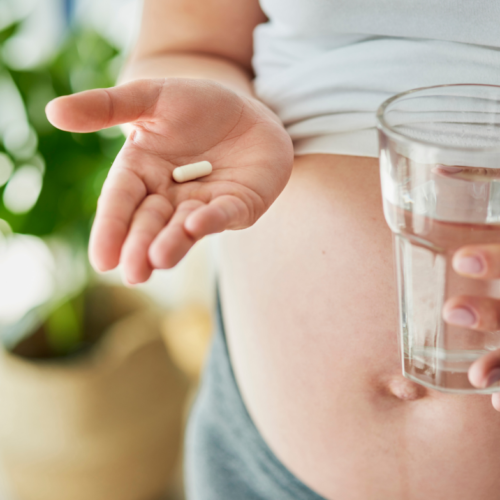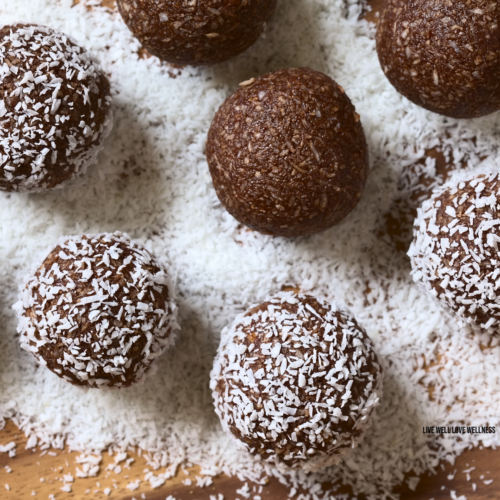Today I share my 5 Tips on how to choose the best prenatal vitamin for pregnancy.
This is a topic I’m very passionate about, and I’m extremely excited to share with you the five things that you need to look out for when you’re choosing a good prenatal vitamin for pregnancy.
Tip 1 – Real vs Fake

So the first tip I have for you is to make sure your prenatal vitamin is a wholefood supplement.
You want to make sure that the vitamins and minerals within your prenatal supplement are coming from a wholefood source and are bioavailable for the body.
Our body assimilates, recognises and utilises food so much more than it ever has done chemicals. Unlike many of the synthetic versions that we often find on the shelf, the lifelong vitality pack offers vitamins and minerals that are bioavailable.
Many of the products found on the chemist shelf are synthetic and you may have to search harder to find a wholefood nutrient based product.
For example look our for an Iodine sourced from kelp not potassium iodide.
Tip 2 – Folic Acid vs Folate

The second tip is to create awareness around folic acid versus folate.
Now there’s so much information available these days, I will keep it really short for you.
I will just paint the broad picture.
Folic acid is the fake, made made, synthetic version of folate.
Folate is the natural version.
However, we can get an activated version of folic acid, which is called folinic acid, and this is a better option than folic acid.
If you can get folate, it is always going to be best to supplement in the natural form rather than the synthetic.
The natural sources are always going to be better for your body as our body recognises, absorbs and can utilise it.
Our bodies struggle to recognise and metabolise chemicals.
So that’s the second tip. Choose folate over folic acid.
Now as a side note.
Folic acid has been studied a lot in the last decade or so, and they’re starting to now understand that higher levels of folic acid through pregnancy have been linked to allergies, as well as tongue and tip ties.
They also speculate that high doses of folic acid may play a large role in pregnancy nausea as when women stop taking their high dose folic acid prenatal their nausea goes away. I personally know many women who were sick on the high dose recommended prenatal vitamins for pregnancy.

Folic Acid Versus Folate Metabolism
A great article published in Belly Belly called Folic Acid During Pregnancy Linked To Allergies explains the metabolism of folate versus folic acid really well.
“Folate is a general name used for a group of compounds that have similar nutritional properties.
Folate is a naturally occurring form of vitamin B9. Before it enters the bloodstream, the digestive system converts folate into a biologically active form of B9, called 5-MTHF.

Folic acid is a synthetic B9. When it enters the body, it isn’t converted into the active form of vitamin B9 very well. As a result, there can be a build-up of unmetabolised folic acid circulating in the bloodstream.
There have been growing concerns that higher levels of unmetabolized folic acid are linked to health problems, including increased cancer risk and B12 deficiency.
It’s been shown a daily dose of 400mcg can be responsible for causing unmetabolized folic acid to build up in the bloodstream. This is the same amount as the recommended daily dose for women who are planning to conceive or are pregnant.
Recent research has also shown taking folic acid late in pregnancy can increase the risk of allergies in babies after birth.”

So I ponder on the notion of why a prenatal vitamin that’s recommended to pregnant women would contain up to 800umg (for a daily dose) which is concerning given our body cannot metabolise it. And worse yet the remaining folic acid that is not metabolised is left in the bloodstream.
So it is extremely important that you are very mindful of the prenatal vitamin that you choose, and you know that it is going to support you and your baby throughout pregnancy.
So choose folate, not folic acid.
My prenatal contains folate from lemon peel not folic acid.

However if you have the MTHFR gene mutation you may need to consider supplementing with active forms of folate such as methylfolate and folinic acid.
Bodybio says it well…
“Folate or Folinic Acid, not Folic Acid. If you see folic acid in your B9 supplement, it’s not going to be beneficial for you (or baby, if you’re pregnant). Especially if you know you have the MTHFR gene variant, run the other way from folic acid. Remember, this includes fortified foods, so keep an eye on your intake!

You want the bioavailable forms of folate or folinic acid. Keep an eye out for 5-methyltetrahydrofolate or 5-MTHF; this is a good bioavailable folate. 5-MTHF is the most biologically active form of folic acid/folate. It is well-absorbed, even when gastric pH is less than optimal, and its bioavailability is not compromised in the face of metabolic missteps. “
Tip 3 – Is there anything Nasty Lurking in my Prenatal Vitamin for Pregnancy
Tip number three.
When you look at your prenatal vitamin, have a little look to see what else is in the ingredients.
We want to be checking our labels with everything we buy.
We want to make sure there’s no GMO, look at the fine print.

It will tell you on the packaging: NO GMO.
You want to buy a prenatal that is gluten free, wheat free and dairy free. All the things that can be linked to intolerances and cause inflammation in the body.
Be mindful of clever wording such as NO ADDED yeast, gluten dairy etc. This means the company has not added these to the product but that they are in the ingredients that they sourced before combing the product as one. It DOES NOT mean the product is free from these additives.
That’s number three: no GMO, no gluten, no wheat, no dairy. Also make sure there’s not artificial colours, sweeteners, preservatives or flavourings.
Just make sure when you check your labels that you’re not supplementing a prenatal with any of these things in it.
Tip 4 – Different Countries have Different Regulations

4th tip for you is about understanding that different countries have different regulations, so wherever you’re buying your prenatal vitamin from, be really, really mindful what they allow in their supplements.
I’m here in Australia, and it is extremely hard to find a folate based prenatal vitamin, so we have to go overseas to get something with folate in it.
The best you can get in Australia is folinic acid. Again, it’s the activated version of folic acid, so it is better, but it’s still not the natural version.
So just for you to be aware, with my fourth tip it’s really to be mindful of what you’re trying to source and what you’re looking for in a prenatal vitamin for pregnancy.
What if you are looking for folate and you are in Australia, you may have to go overseas to get it. This tip is to help you source what you are looking for.
Tip 5 – Does your Prenatal Vitamin offer you other Goodness
My fifth and final tip is when you’re choosing a prenatal vitamin for pregnancy consider the other benefits that the supplement can offer you.
When you are pregnant you are wanting to give your body the nutritional base it needs right. We are supplementing for a reason. There’s no use however to feed our body a prenatal vitamin that doesnt give us any benefit.
We want to be feeding our body things that are going to benefit our body. Prenatal vitamins are not cheap and to be paying top dollar for synthetic ingredients is not ideal.
We want a wholefood prenatal vitamin that offers us the benefits, nutrition and goodnes that we need to remain healthy, and thrive through out our pregnancy.
Check your prenatal vitamin for any additional ingredients that may serve your health and support your body systems.

A wholefood blend is a good example, maybe they have added some green powder, spinach, kale, broccoli to help you with your vital greens.
In pregnancy, we can be very picky about food and it can be difficult to eat some types of foods. Having the added extras in your prenatal vitamin supports your nutrition levels even if your diet is not adequate.
If the prenatal adds in some of kale powder, broccoli, brussel sprouts, spinach or dandelion you know those extra greens and things like that are there as extra support, which is fantastic.
In addition, see if the formula also contains a blend of digestive enzymes and mineral cofactors to enhance digestion and help with the assimilation of nutrients.
The prenatal vitamin that I use has all those extras in it, and I do really believe those extra nutritional benefits and digestive enzymes really do assist with digestion, and overall support for the body.
To wrap up how to choose the best Prenatal Vitamin for Pregnancy
So just to recap.
Number one: Make sure it’s a whole food supplement, not synthetic.
Another way you can tell……
Is your iodine from a food source? Is it coming from kelp or is it coming from something synthetic?
It’s pretty easy to tell when you check your labels.

Number two: Does it contain folate or folic acid or folinic acid. If you can’t get folate go for folinic acid. Just not folic acid.
Number three: Be mindful of where you’re purchasing your supplements from because each country has different regulations.
Number four: Make sure that it doesn’t have GMO, wheat, gluten or dairy and is free from artificial sweeteners, colours, preservatives and flavours. Look out for NO ADDED wording which is misleading.
Number five: If it’s got some extra added goodness in there, that is amazing, too. Look out for wholefood blends, a blend of digestive enzymes and mineral cofactors to enhance digestion and help with the assimilation of nutrients.
I’m after more tips please
Now, if you’re wanting more tips, and you’re very keen to choose the very best prenatal for pregnancy, we do have a cheat sheet with a full list of all. the things you need to look out for.
You can get it free by downloading below:
I put this check list together because these are the points I considered when I chose my prenatal vitamin for pregnancy.
I went through the checklist and I made sure that the choice I was making was appropriate and met all the needs that were important for me and my growing baby.
If you would like to listen to me talk about this topic please check out my video below:
What Prenatal Vitamin for Pregnancy did I Choose?

When I was pregnant with my second child I was extremely fatigued.
I was sleeping at every possible moment each and every day and wondered if my prenatal vitamins at the time were even helping me.
So I began to do lots of research.
What should my prenatal vitamin for pregnancy contain, what’s good, what’s bad, what’s real, what’s fake and where and how are the ingredients in my supplements being made?
I basically started asking lots of questions.

I had recently started my own no-tox journey and the company that I had chosen to support me on that journey was doTERRA. I had thoroughly researched their essential oils and they offered everything I was searching for in an essential oil company.
They were transparent, ethically sourced, morally sourced, and were so committed to quality and therapeutic value that I was impressed (and that’s hard to do with a chemical scientist as we love detail).
Let’s say they have thought of everything to ensure we receive the most incredible, therapeutic essential oils in the world.
So I was following a few groups about the essential oils and one post grabbed my attention about wholefood supplements and the importance of supplementing from food sources not synthetic sources and how the lifelong vitality pack was a great prenatal and postnatal supplement of choice.
It talked about folate verses folic acid and how folate is real and folic acid is fake (synthetic) and the importance of choosing the real version. So I started to research the lifelong vitality pack and was very impressed with what I found.

And to give you just the short version, I have been using the lifelong vitality pack as my prenatal and postnatal ever since and know that it has made such a world of difference now that my body is absorbing, and utilising these amazing ingredients.
I wish this for every pregnant women out there. Find a prenatal vitamin that works for you and make sure you research and educate yourself to ensure what you are using is safe and effective. The professionals are all too quick to recommend the popular brands but these are certainly not supporting your body or baby nor have your best interests at heart.
So choose wisely!
You can learn more about the lifelong vitality pack on our recent blog post and I show you how you can try them risk free with a 30 day money back guarantee. Sounds great doesn’t it.
Just to note – the LLV Pack in Australia contains folinic acid (see tip 4 for more info) and the LLV Pack in USA contains folate. You can nominate where your products are being shipped from upon set up of your account.
I really hope this has helped you and given you some great pointers to start with.





